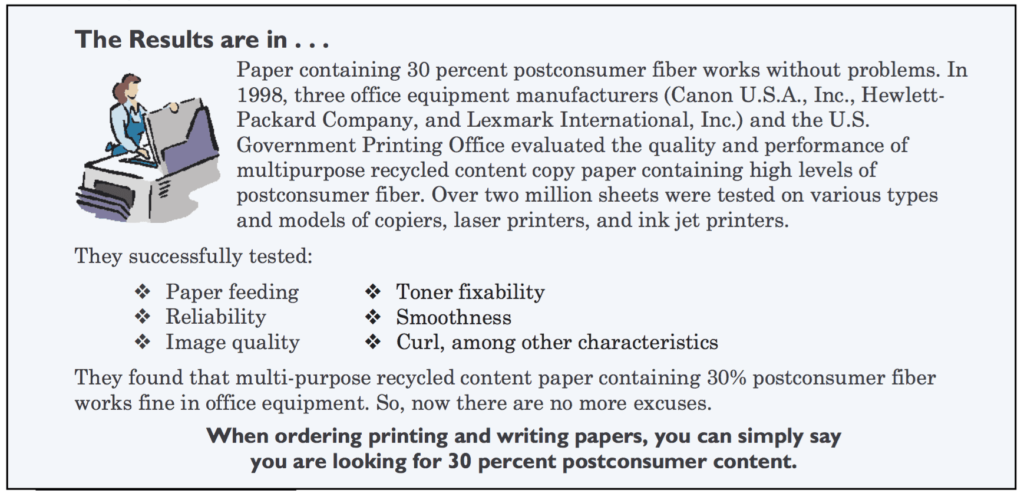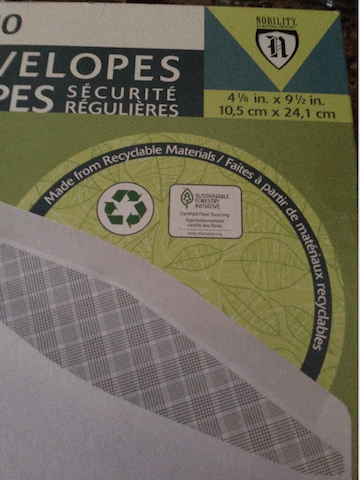
Would you agree that buying recycled paper is a simple first step that any business can take when they embark on their sustainability journey?
Of course! In fact, I would question whether a business can even be considered sustainable if they don’t take this first, basic step at resource conservation.
Yet it isn’t always as straightforward as you might think. The terminology can be confusing, the paper companies can be misleading, the certifications are unclear – and one pesky myth contains to get attention.
This post will help to clarify all of this so that you can make a more informed decision when it comes to your paper purchases.
Understanding the Definitions for Recycled Paper Products
Let’s start with some basics. Here’s a quick rundown of the terms that you might find on a package of copy paper:
- Recycled – this is an easy one:

When paper is recycled and turned back into paper, we refer to that as recycled paper. This is in contrast to virgin paper that is made exclusively from trees and has no recycled content. The primary environmental benefit of using recycled instead of virgin paper is that it reduces the need to cut down trees in order to make more paper.
- Post-consumer waste (PCW) – this refers to paper that has reached the end consumers (all of us who are using paper and then tossing it in our recycle bins) and then been turned back into paper. The difference between the recycled paper mentioned above and post-consumer waste paper is that the recycled paper may not have reached the end consumer; for example, it can include paper that was trimmed in the paper mills and then turned into paper again, so that it is recycled paper but contains no post-consumer waste. Paper that contains post-consumer waste will clearly state it, as shown in the image to the right top (note the “30% PCW” underneath the shark).
- Recyclable – this is the sneakiest of the paper industry’s marketing ploys.

Recyclable materials, the recycled symbol, and SFI certification – but no recycled content. They label their paper as either being recyclable or made from recyclable materials in order to intentionally mislead consumers into thinking that they’re buying a product made from recycled content. Basically, they’re just telling you that paper is recyclable – that it can be recycled – but we already know that! Take a look at the second image on the right. At first glance, this would appear to have recycled content, but in reality it doesn’t (for more about the SFI certification shown there, see the section below).
- Processed chlorine-free/unbleached – this means that bleach was not used to make the paper white. The ubiquitous white copy paper that we find in every office has traditionally required bleach in order to give it its white appearance. However, using bleach is not good for the environment, and now there are papers that are processed without bleach. If the paper you purchase was processed chlorine-free, this will be stated on the package.
Note that for businesses that are seeking Green Business Certification, your copy paper must contain at least 30% post-consumer waste. For B Corp Certification, there is no minimum requirement, but you do get credit for purchasing paper that is recycled and processed chlorine-free.
Making Sense of Paper Certifications
To make things even more complicated, you’ll need to also evaluate the certifications for forest management. The top two are:
- Forest Stewardship Council (FSC) – Originally founded in the early 1990s, it remains the only sustainable forestry certification that is accepted by environmental groups such as the World Wildlife Fund, Greenpeace, the Sierra Club, and the National Resources Defense Council. The organization has identified 10 principles that guide its forest management, including protecting the rights of workers and indigenous peoples whose local communities depend upon and are impacted by the forests.
- Sustainable Forestry Initiative (SFI) – this certification has been criticized because of its connections to the paper industry. As a result, many companies including HP, Office Depot, and Southwest Airlines stopped buying SFI paper in favor of FSC paper.
Though the two certifications appear to be equal when you view their labels on a package of paper, I prefer the FSC certification because it is supported by environmental groups and looks at forest management holistically through its use of the 10 principles.
Does Recycled Paper Jam Printers?
Surprisingly, even here in the Bay Area in this day and age, I still occasionally run into someone who will explain to me that their business can’t use recycled paper because it will jam the printer. Really? In a couple of cases, they even been told by their printer technician to avoid using recycled paper.
It’s time to put this myth to rest: recycled copy paper will not jam printers or copy machines. Thousands of businesses and organizations, including the federal government, have been using recycled paper for years. This myth is a relic of a time when the quality of recycled paper was not what it is today. Yes, there was a time when recycled paper was in its early days and it did sometimes jam the printers, but that was long ago.
Still not convinced? As far back as 1998 (!), this myth was being debunked:

For more information about paper, you can download the Paper Facts document from which the image above was obtained.
Where Can You Buy Recycled paper?
Now, once you’ve determined the type of paper that you want to buy, you’ll need to figure out where to buy it.
Fortunately, finding recycled paper is quite easy, so I usually recommend that businesses first check to see what’s available from the vendor that is already supplying their paper products (or check the store where you normally buy paper).
However, if your current vendor doesn’t carry post-consumer waste paper at a reasonable price, here are other places to check:
- Blaisdell’s – this is a Certified Green Business that offers a wide variety of recycled paper products and other green office supplies.
- Amazon – if your business already orders from Amazon, you’ll find that they carry a wide range of recycled paper products.
- Staples – their Sustainable Earth line actually carries quite a number of environmentally-preferable options for common office supplies, from recycled paper to third-party certified cleaning products.
- Costco Business Center – Costco does carry a limited supply of recycled content paper, including the Boise and Hammermill brands.
The key when buying your paper is to make sure that it clearly specifies that it has “post-consumer waste.” It’s also a good idea to do some price comparisons; the items that I’ve linked to above are there to give you an idea of your options, but you’ll find that the prices can range considerably in some cases.
Also, although this post has focused on copy paper, you should also consider switching your other paper purchases so that you’re not buying virgin paper anymore. Paper towels, napkins, toilet paper, note pads, envelopes, and almost any paper product you might need can all now be found with recycled content.

